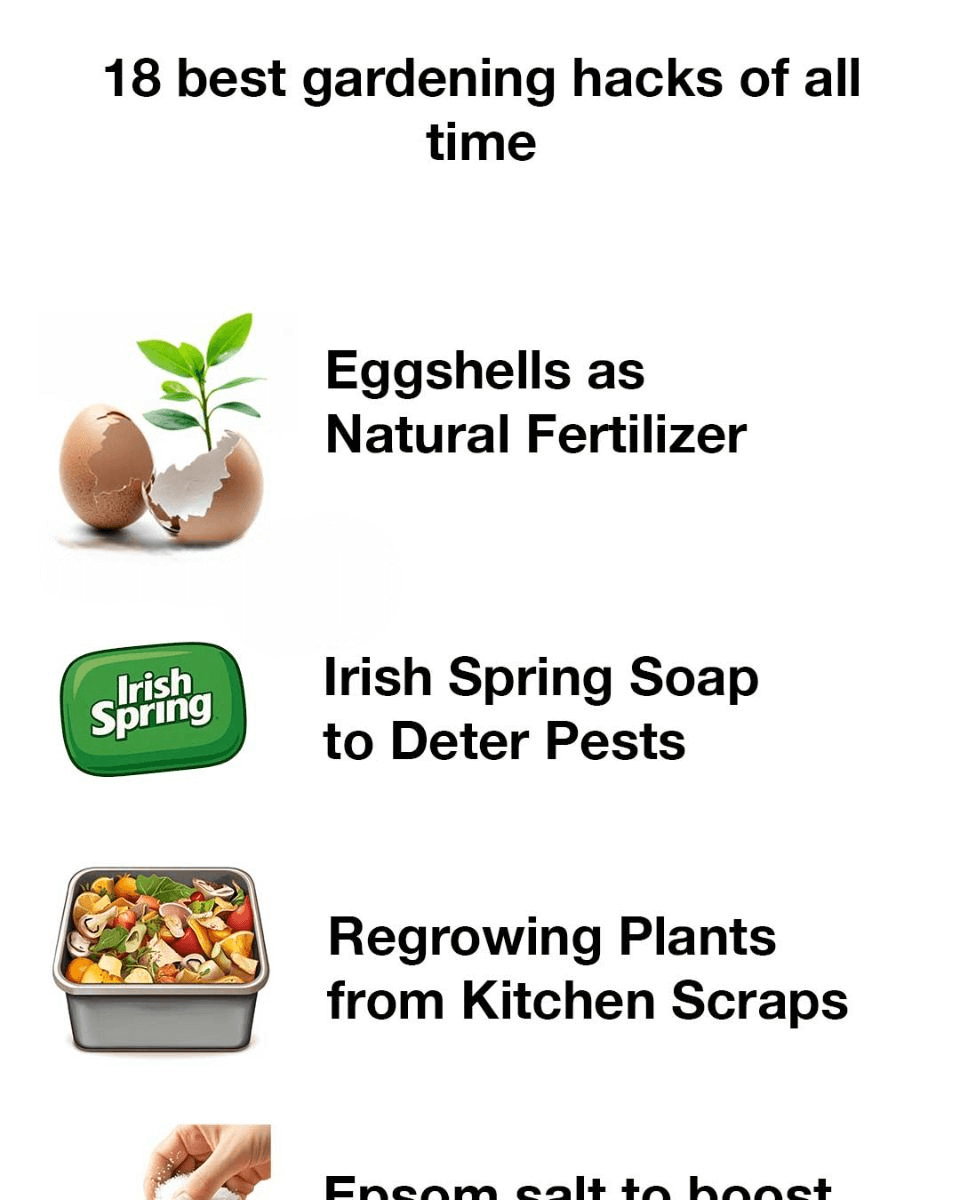Gardening is a fulfilling hobby, but it can come with its fair share of challenges. Whether you’re just starting out or have years of experience, finding smarter, more efficient ways to grow healthy plants is always valuable. Below are 18 tried-and-true gardening hacks that will help you enrich your soil, fend off pests naturally, boost your harvest, and save both time and money.
1. Crushed Eggshells for a Calcium Boost
Eggshells are an excellent natural source of calcium, which helps strengthen plant cell walls. Crush them and mix into the soil to provide a steady calcium supply. This is especially useful for tomatoes and peppers, which can suffer from blossom-end rot due to calcium deficiency.
2. Coffee Grounds to Nourish the Soil
Used coffee grounds are full of nitrogen, an essential nutrient for plant growth. Add them to compost or work them directly into the soil to improve texture, feed plants, and attract earthworms that naturally aerate the ground.
3. Vinegar as a Chemical-Free Weed Killer
Thanks to its high acidity, vinegar works well to kill weeds naturally. Spray it directly on unwanted plants during sunny days for maximum effect. Just be careful not to spray your desired plants, as vinegar doesn’t discriminate.
4. Grow New Plants from Kitchen Scraps
Many vegetables can be regrown from leftovers. Place the root ends of green onions, lettuce, or celery in water and watch them sprout again. It’s a fun and eco-friendly way to reduce food waste and keep your kitchen stocked.
5. Epsom Salt for Stronger Plants
Epsom salt contains magnesium and sulfur—two elements that promote healthy growth. Dissolve it in water and use it to feed your plants, particularly roses, tomatoes, and peppers, for more vigorous development and vibrant blooms.
6. Repel Pests with Irish Spring Soap
The strong scent of Irish Spring soap deters garden intruders like rabbits and deer. Cut the soap into pieces and scatter them throughout your garden, or hang them from posts to protect your plants naturally.
7. Companion Planting to Keep Pests Away
Pairing certain plants together can boost growth and deter harmful insects. For instance, marigolds repel nematodes when planted near tomatoes, and basil helps ward off flies while enhancing tomato flavor. It’s a natural way to promote a healthy garden ecosystem.
8. Build a Simple Drip Irrigation Setup
Create your own drip irrigation system using hoses or tubing with tiny holes. This ensures water is delivered right to the roots, reducing evaporation and water waste. It’s a low-cost solution for consistent and efficient watering.
9. Newspaper Mulch for Moisture and Weed Control
Lay down a few sheets of newspaper around plants, then top with mulch like straw or bark. This helps retain moisture, suppress weeds, and eventually adds organic matter to the soil as the paper decomposes.
10. Baking Soda for Sweeter Tomatoes
A sprinkle of baking soda around tomato plants can help reduce soil acidity, leading to sweeter fruit. Be cautious not to overuse it—too much baking soda may disrupt the soil balance and harm your plants.
11. Banana Peels as Natural Fertilizer
Rich in potassium, phosphorus, and calcium, banana peels are a great way to naturally feed your plants. Bury them in the soil or soak them in water to make a nutrient-packed “tea” that encourages healthy root and flower development.
12. DIY Compost Bin for Richer Soil
Turn kitchen scraps and yard waste into valuable compost by building your own compost bin. Use a large container or construct a simple wooden frame. Turning the pile regularly will speed up the process, giving you nutrient-rich compost to feed your garden.
13. Cinnamon to Combat Fungus
Cinnamon’s natural antifungal properties make it ideal for preventing mold and mildew. Dust it on the soil or plant wounds to protect against fungal infections. It’s a gentle, chemical-free alternative to store-bought fungicides.
14. Hydrogen Peroxide for Healthy Roots
Diluting hydrogen peroxide with water and applying it to the soil can help prevent root rot and boost oxygen levels. It’s especially helpful for potted plants and seedlings that need extra care to avoid overwatering and disease.
15. Neem Oil for Organic Pest Control
Extracted from the neem tree, neem oil is a powerful natural pesticide. It’s effective against pests like aphids and spider mites while being safe for beneficial insects. Regular spraying helps maintain pest-free plants without harmful chemicals.
16. Maximize Space with Vertical Gardening
Short on room? Use vertical planters, wall mounts, or trellises to grow plants upward instead of out. This method is great for herbs, strawberries, and even small vegetables, and adds visual interest to your garden space.
17. Milk Spray to Treat Fungal Issues
Mixing milk with water and spraying it on your plants can help prevent and treat powdery mildew and other fungal problems. The natural enzymes in milk serve as an antiseptic, making this a gentle, effective remedy.
18. Rotate Crops Each Year
Changing the placement of your crops annually helps prevent soil exhaustion and breaks pest and disease cycles. By rotating plant families, you promote long-term soil health and reduce dependency on fertilizers and pesticides.
Final Thoughts: Simple Tricks for a Thriving Garden
These gardening hacks are straightforward, affordable, and incredibly effective. Whether you’re aiming to boost yields, improve soil, or protect your plants from pests, these time-tested tips will help you get the most out of your garden. No matter your experience level, incorporating a few of these strategies can lead to healthier plants and a more productive growing season.
